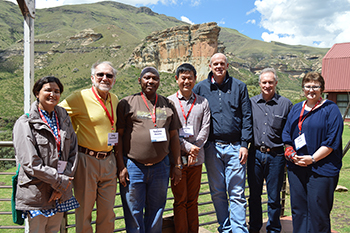Latest News Archive
Please select Category, Year, and then Month to display items
09 December 2020
|
Story UFS entral academic advising team
|
Photo Pixabay

It wasn’t easy, but we all got to this point because we stayed calm and made the effort to learn on even when it was difficult.
The University of the Free State (UFS) has remained committed to supporting you in every way possible, and as you prepare for the final assessments, remember to access the support tools you will need in order to successfully complete the 2020 academic year: https://www.ufs.ac.za/toolsforsuccess
Main exams are running from 30 November to 19 December 2020
All of the best, and break a pen in your upcoming final assessments. For those of you who will be graduating, we cannot wait to see you in that graduation attire; and those who still have some way to go, we cannot wait to serve you again in 2021 as we continue the pursuit of academic success!
Below are five main study tips that you can use for final assessment success:
1. Set a realistic study schedule
You might think that studying for eight hours straight for four days before the exam, will help you get through the work in time. See final edition of the #UFSLearnOn for more information.
2. Structure and organise your work
If your notes are organised, it is also easier for your brain to recall information, even when you become nervous during exams.
3. Practise with an old exam/semester test paper
Practice makes perfect, and although the final assessments might look different in how they are administered, it will still help to practise using old tests and exams.
4. Adapt your strategies to the content
What works for one module or even one learning outcome, might not be effective for another. You need to continually adapt your note-taking and study approaches. See #UFSLearnOn final edition for different study methods.
5. Healthy body, healthy mind
Your brain needs optimal care to perform at its best, and getting physically active (even if it is by jumping in one spot if space is limited) forces your body to release neurotransmitters responsible for positive emotions, which assist in retaining information in your memory …
Download the final edition of #UFSLearnOn that points you towards the resources you’ll need to ace your final assessments and end 2020 off on a high note!
Young researchers shine during the international Afromontane Colloquium
2017-07-18

From the left, are: Drs Reetu Sogani (India),
Greg Greenwood (US-Switzerland), Teboho Manchu,
Acting Campus Principal, Drs Jianchu Xu (China),
Henri Rueff (Switzerland), Glen Taylor, Senior Director:
Research Development; and Dr Elsa Crause,
Campus Vice-Principal: Academic and Research.
Photo: Thabo Kessah
The University of the Free State’s Afromontane Research Unit (ARU), which is situated on the Qwaqwa Campus, has the potential to produce some of the world’s best and dynamic young researchers. This is the view shared by Drs Henri Rueff and Reetu Sogani, who were the keynote speakers during the ARU Colloquium hosted at Golden Gate in the Eastern Free State.
Dr Rueff, a geographer and environmental economist from the Universities of Basel and Bern in Switzerland, was referring to no less than ten Qwaqwa Campus postgraduate students who made oral and poster presentations during the inaugural international colloquium.
Colloquium an opportunity to interact
“You have some of the world’s most motivated and highly skilled students who have the courage to stand in front of extremely critical scientists from all over the globe – and that must be commended,” he said.
Dr Reetu Sogani from India said that her first trip to South Africa did not disappoint. “This colloquium was a very good learning experience for me as I had the opportunity to interact with brilliant and young scientists from this part of the world,” she added.
In closing the colloquium, the Senior Director: Research Development, Dr Glen Taylor, committed the UFS to the success of the unit.
“The ARU will strengthen the research output of the campus. But most important of all, it is setting the research agenda for the Qwaqwa Campus, and for the institution at large, to address the challenges that the surrounding mountain communities are faced with,” he said.